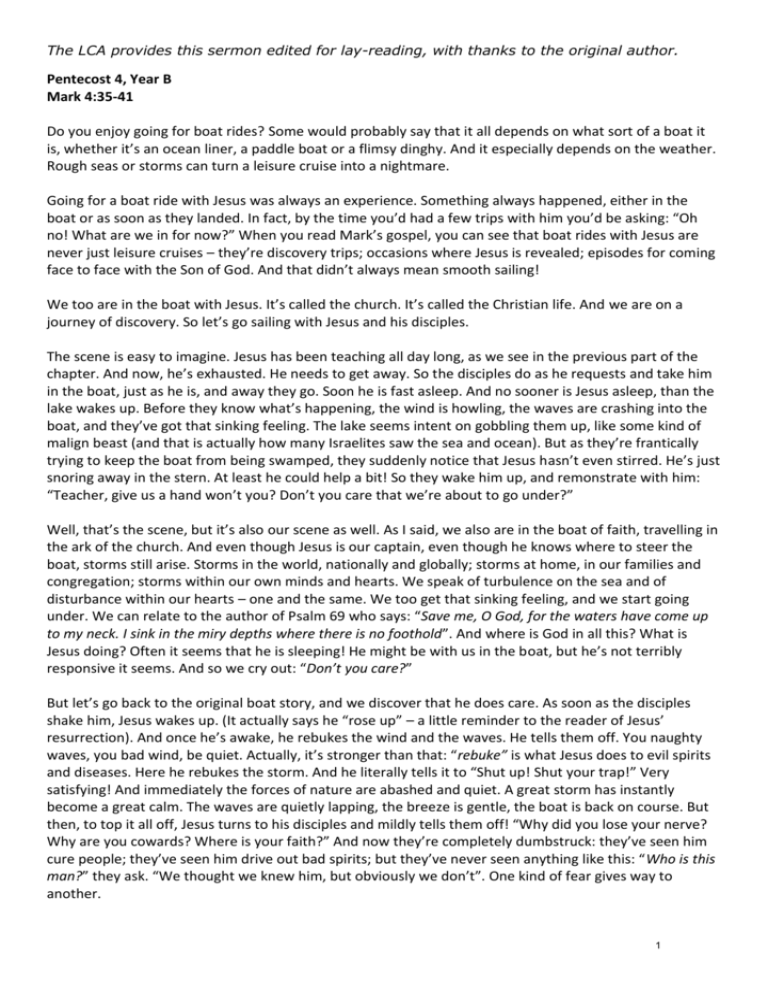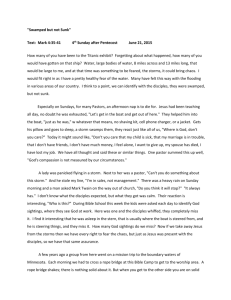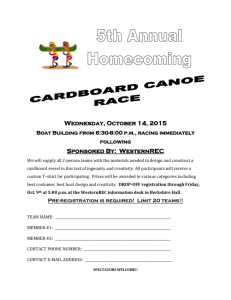sermon - mark 4 35-41
advertisement

The LCA provides this sermon edited for lay-reading, with thanks to the original author. Pentecost 4, Year B Mark 4:35-41 Do you enjoy going for boat rides? Some would probably say that it all depends on what sort of a boat it is, whether it’s an ocean liner, a paddle boat or a flimsy dinghy. And it especially depends on the weather. Rough seas or storms can turn a leisure cruise into a nightmare. Going for a boat ride with Jesus was always an experience. Something always happened, either in the boat or as soon as they landed. In fact, by the time you’d had a few trips with him you’d be asking: “Oh no! What are we in for now?” When you read Mark’s gospel, you can see that boat rides with Jesus are never just leisure cruises – they’re discovery trips; occasions where Jesus is revealed; episodes for coming face to face with the Son of God. And that didn’t always mean smooth sailing! We too are in the boat with Jesus. It’s called the church. It’s called the Christian life. And we are on a journey of discovery. So let’s go sailing with Jesus and his disciples. The scene is easy to imagine. Jesus has been teaching all day long, as we see in the previous part of the chapter. And now, he’s exhausted. He needs to get away. So the disciples do as he requests and take him in the boat, just as he is, and away they go. Soon he is fast asleep. And no sooner is Jesus asleep, than the lake wakes up. Before they know what’s happening, the wind is howling, the waves are crashing into the boat, and they’ve got that sinking feeling. The lake seems intent on gobbling them up, like some kind of malign beast (and that is actually how many Israelites saw the sea and ocean). But as they’re frantically trying to keep the boat from being swamped, they suddenly notice that Jesus hasn’t even stirred. He’s just snoring away in the stern. At least he could help a bit! So they wake him up, and remonstrate with him: “Teacher, give us a hand won’t you? Don’t you care that we’re about to go under?” Well, that’s the scene, but it’s also our scene as well. As I said, we also are in the boat of faith, travelling in the ark of the church. And even though Jesus is our captain, even though he knows where to steer the boat, storms still arise. Storms in the world, nationally and globally; storms at home, in our families and congregation; storms within our own minds and hearts. We speak of turbulence on the sea and of disturbance within our hearts – one and the same. We too get that sinking feeling, and we start going under. We can relate to the author of Psalm 69 who says: “Save me, O God, for the waters have come up to my neck. I sink in the miry depths where there is no foothold”. And where is God in all this? What is Jesus doing? Often it seems that he is sleeping! He might be with us in the boat, but he’s not terribly responsive it seems. And so we cry out: “Don’t you care?” But let’s go back to the original boat story, and we discover that he does care. As soon as the disciples shake him, Jesus wakes up. (It actually says he “rose up” – a little reminder to the reader of Jesus’ resurrection). And once he’s awake, he rebukes the wind and the waves. He tells them off. You naughty waves, you bad wind, be quiet. Actually, it’s stronger than that: “rebuke” is what Jesus does to evil spirits and diseases. Here he rebukes the storm. And he literally tells it to “Shut up! Shut your trap!” Very satisfying! And immediately the forces of nature are abashed and quiet. A great storm has instantly become a great calm. The waves are quietly lapping, the breeze is gentle, the boat is back on course. But then, to top it all off, Jesus turns to his disciples and mildly tells them off! “Why did you lose your nerve? Why are you cowards? Where is your faith?” And now they’re completely dumbstruck: they’ve seen him cure people; they’ve seen him drive out bad spirits; but they’ve never seen anything like this: “Who is this man?” they ask. “We thought we knew him, but obviously we don’t”. One kind of fear gives way to another. 1 It’s easy to feel a little sorry for the disciples at this point. After all, here they were, practically gargling the waters of Lake Galilee, and Jesus tells them they didn’t have enough faith. What were they meant to do? Jesus doesn’t actually say what they should have done, but we can imagine: either they should have prayed calmly and confidently to their heavenly Father; or they themselves could have commanded the storm to be quiet; or they could have just gone to sleep like Jesus! But whatever Jesus had in mind, one thing is clear: he was calling them to act from faith, and not out of fear. Well, back to our boat again. Isn’t this true of us too? Yes, we’re in the boat with Jesus, but when storms arise we also fear, because our faith is small. Our fears, or our anxieties, or our gut wrenching worry often get the better of us, because we don’t trust our Lord. And it’s this lack of faith expressed as fear that can often lead us into sin. Think of the people in the bible – it was often fear which lead them into trouble. Adam and Eve’s fear led them to blame each other; Abraham’s fear that God’s promise of a child would not come true led him to start his own family through Hagar; King David’s fear that his adultery would be discovered led him to arrange Uriah’s death; the fear of the Israelite kings in the face of stronger nations led them and the nation into idolatry. Today the church’s fear of being irrelevant or old fashioned can lead it into sin and error. Many of our sins, be they materialism, or lust, or anger, can often be traced to our fears – fears which simply result from our little faith in Christ. Either we think he’s not in the boat, or we think he’s asleep, or we don’t know him well enough to trust in him in the first place. Let’s all look into ourselves and discover if our outward faults don’t stem from the same cause. But if the fear of the disciples is also true of us, so is the help they received. Think through the story point by point, and it all applies to us. First, Christ is always with us in the boat – even when the storm is raging, even when we’re sinking. This captain does not desert his boat. Second, Christ does care, even when it appears he’s sleeping. You see, Jesus’ nap in the boat was not a sign that he didn’t care – it instead showed how confident he was. So firmly has he placed us in his Father’s hand that he can sleep peacefully. He doesn’t need to rush about frantically like we often do. His sleeping is not carelessness, it’s peacefulness, it’s the calm eye of the storm. Just as his sleep in the boat led to his calming of the storm, and just as his sleep in the tomb led to his rising from the dead, so his apparent sleeping through our storms is but a prelude to his powerful rising afresh in our lives. This leads to the third point: that Christ is powerful and has authority. The sea and the wind listen to his voice, so does every atom in the world. No rock, no cell, no molecule, no cloud, can resist his voice. Christ does not have to fight desperately over the forces of nature – he has risen above them, and they are under his feet. Just as it was for the disciples, so it is for us: Christ is with us in the boat. He cares. He is powerful. And what does that mean for us? To begin with, stay in the boat. Stay with Christ, stay with the church. Dry land might seem safer and more predictable, but Christ calls you to go sailing with him. And it’s only in the boat with him that you will discover yourself and your Lord. Next, get to know Christ better. The disciples didn’t trust because they didn’t know the measure of the man. In fact, their tape measure was a million miles too short. At the end of the episode they were still asking “Who is this man?” They would be asking it for some time to come. And even though we know the story, and how it ends; and even though we can confess Jesus as true God and Lord and Saviour as we do in the Creed, we still need to discover for ourselves, through our own boat rides, who this man is. And when we know him, we can do the next two things: we can trust him, and we can act with courage. We trust in his care; we trust in his power, and then we act accordingly. When the storms arise we can commit it to God, we can tell the waves to shut their trap, or we can simply go to sleep next to Jesus. But if all else fails, if we do forget his power, if we do lose our nerve, never forget that you can also cry to him: “Lord, don’t you care that I’m drowning?” And that’s because even though Jesus calls us to ever greater faith, a little faith, even a tiny faith, is still infinitely better than no faith at all. So, friends in Christ, bon voyage! 2 And may the peace of God which surpasses all human understanding, guard our heats and minds in Christ Jesus. Amen. 3








